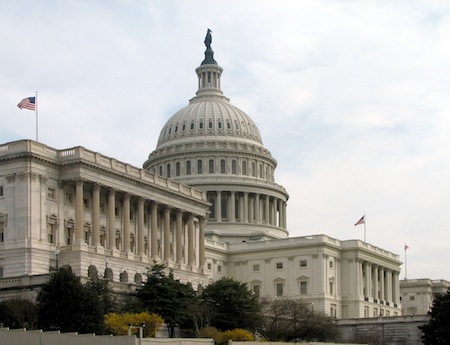Senate Commerce Approves MOBILE NOW Act

The smarter way to stay on top of broadcasting and cable industry. Sign up below
You are now subscribed
Your newsletter sign-up was successful
The MOBILE Now Act, which would take numerous steps to boost wireless broadband, passed unanimously out of the Senate Commerce Committee loaded with amendments on everything from shot-clocks for approving facilities, to dig-once policies for combining road projects and telecom plant, to a contest offering up to $5 million for the first person to come up with a way to boost spectrum efficiency.
The bipartisan bill, which is meant to boost the buildout of 5G mobile broadband, was the result of months of negotiations, and Commerce chairman John Thune (R-S.D.) said he thought the bill had a good chance for passage by the full Senate.
“The committee’s advancement of the MOBILE NOW Act was truly a bipartisan effort,” Thune said following the markup.
“Enactment of this legislation will pave the way to a 5G future where Americans have access to ultra-fast, next generation wireless technology.”
Included in the bill was an amendment, backed by wireless broadband spectrum fan Sen. Marco Rubio (R-Fla.), that would insure that at least 100 MHz of the spectrum being freed up would go for unlicensed use and another 100 MHz for commercial mobile service, with a handwritten addition to the amendment saying that commercial use was "subject to the [FCC's] regulatory purview to implement exclusive licensing in a flexible manner, including consideration of continued use of such spectrum by incumbent federal or non-federal entities in designated geographic areas indefinitely.
Among the reasons for the tough negotiations on the bill were the tensions between licensed and unlicensed, as well as commercial and incumbent government users of the spectrum. Ranking member Sen. Bill Nelson (D-Fla.) said he thought the bill had struck the right balance among those.
Not included in the bill was a last-minute amendment that would have helped broadcasters in the post-incentive auction repack and an FCC process reform bill amendment from Sen. Dean Heller (R-Nev.).
The smarter way to stay on top of broadcasting and cable industry. Sign up below
Also not included was a bill, introduced by a bipartisan group of senators, that would direct the FCC to identify the spectrum requirements for the growing Internet of things (IoT) and study the impact of connected technologies.
Introducing the bill were Deb Fischer (R-Neb.), Cory Booker (D-N.J.), Kelly Ayotte (R-N.H.), and Brian Schatz (D-Hawaii).
Fischer said in withdrawing the bill for consideration as an amendment that she had gotten assurances that it would be taken up as a stand-alone bill in the committee next month.
A dozen noncontroversial amendments were agreed to by voice vote, including ones promoting unlicensed spectrum, a study of the availability of Wi-Fi hot spots in low income neighborhoods, and the spectrum contest.
Back in December, Sen. Tom Udall (D-N.M.) and Rep. Doris Matsui (D-Calif.) proposed the contest in the Spectrum Challenge Prize Act.
They pointed out back then, and Udall echoed at the mark-up this week, rather than pay for R&D that may not pan out, a challenge prize only rewards success.
Wireless carriers were understandably pleased at MOBILE Now's progress.
“CTIA congratulates Chairman Thune and Senator Nelson for their bipartisan collaboration on the MOBILE NOW Act," said president Meredith Attwell Baker. "As today’s Senate Commerce Committee activity demonstrates, there is deep interest in spectrum policy on both sides of the aisle. By pushing to bring more licensed and unlicensed spectrum to market, unlocking millimeter wave spectrum and streamlining the process for deploying wireless infrastructure, the bill reported today draws on good ideas from both sides of the political spectrum to advance America’s continued leadership in the wireless marketplace."
“Sprint commends the Senate Commerce Committee and the leadership of Senators Thune and Nelson for approving the MOBILE NOW Act. The Committee recognized today that wireless carriers like Sprint could more quickly deploy their networks if access to federal properties was simplified. This is a critical step in assisting carriers’ efforts to provide the wireless network coverage Americans expect."
Separately this week, FCC chairman Tom Wheeler said the FCC would wrap up its inquiry into authorizing 5G spectrum use by the summer.
Contributing editor John Eggerton has been an editor and/or writer on media regulation, legislation and policy for over four decades, including covering the FCC, FTC, Congress, the major media trade associations, and the federal courts. In addition to Multichannel News and Broadcasting + Cable, his work has appeared in Radio World, TV Technology, TV Fax, This Week in Consumer Electronics, Variety and the Encyclopedia Britannica.

